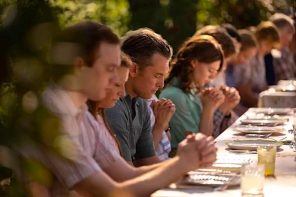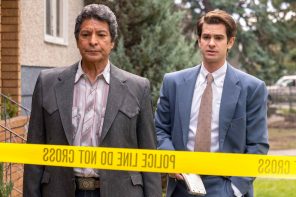We never expected Mitt Romney to tell the story of Mormonism.
He had other work to do. Hard work. He was, after all, running for president.
But what if he had? What if Romney and his handlers had allowed just one Mormon pioneer wagon to roll across the screen during a Republican National Convention biopic?
What if he could have given a speech that connected the Mormon story to the American story, Mormon values to American values?
What if he had said something like this:
I am a member of the Church of Jesus Christ of Latter-day Saints, a Mormon. This has been the faith of my family for generations. My ancestors were common people—laborers in the industrial towns of England, American farmers scraping by—who felt a deep hunger to experience something sacred in their lives. That hunger is in all of us, I think. They joined an American-born Christian movement called Mormonism that promised that all people could know truth for themselves and experience God immediately in their own lives. And because the pull of faith was so strong, they left their towns and their farms and moved into Mormon communities in Ohio, Missouri, and Illinois—to practice their faith as a way of life. They dreamed that old biblical dream of building “Zion”—a place where, as the Old Testament teaches, there would be no strangers. It’s a dream that shares so much in common with the American dream: of starting over, of building on this beautiful continent a place of opportunity.
But people with big dreams often attract big curiosity and big misunderstanding. That’s been the case with my faith too. In the 1830s and 1840s, Mormons including my ancestors experienced intense religious persecution. Their homes were burned, their leaders tortured by mobs. Some were killed. So in the 1840s, Mormons packed up and traveled across the Great Plains in oxcarts, and when they could not afford oxcarts they pulled handcarts. They did what so many American peoples have done—they moved on and started over. This is a story so many Americans know: from the people of Cherokee, Muscogee, Chickasaw, and Choctaw nations, forced by government edicts to march the “Trail of Tears”; the millions of African-American migrants who left the violence of the Jim Crow South to build the great industrial cities of the Northeast and Midwest; or the Jews who fled pogroms and Nazi exterminations. Others have certainly suffered more than Mormons. But we too know the American story of facing loss and finding in our loss the power to build something greater.
Our hard work and industry transformed the American West. We dug irrigation canals that brought water from rugged mountains to the American deserts. We built churches and temples to worship in and universities to educate our children. We raised our families, studied our faith, and shared it with others around the world. We have served faithfully in the American communities where we live, in the US military, and in the United States Congress. And we have struggled—as every community in this nation struggles—to live up to our ideals. Like every community in the U.S., our history includes chapters of racial exclusion that we have renounced and that we continue to work to put behind us. We have been willing to examine ourselves and move on. Because we know we are still working towards that dream of Zion—and there is always a long walk in front of us.
My faith has taught me that big dreams require sacrifice and hard work, and that we have miles yet to travel before we achieve a place where all can enjoy security, liberty, and well-being. But this is not particular to Mormonism. This is an American article of faith, held by people of all religious backgrounds, and of no religious affiliation at all. It’s this faith that we hold in common that I will uphold as president.
But for so many reasons Mitt Romney never gave that speech. He never told that story. It was not in his nature: Romney is a numbers guy, not a storyteller. And his reasons for staying guarded about his faith as a defense against ridicule are as old as Mormonism itself.
But maybe too telling the Mormon story in such a way would entail some political obligations. It would oblige Mormons to ask, what has it all been for? What is the story of the Mormon people in America really about? What kind of moral priorities does it set for us today?
Mormonism is a young faith tradition. We do not have professional theologians. We do have an acutely developed sense of private morality that centers on sexual chastity, church attendance, tithe-paying, and the nuclear family. But we have not developed a public morality on questions like war, peace, human rights, torture, money, and power. At least not one robust enough to inform day-to-day conversation or decision-making, or politics.
Which is startling given that the Book of Mormon—a text virtually no one dared to quote in public during this so-called “Mormon moment”—is extremely eloquent on war and peace, and the dangers that proceed from wealth and pride.
American Mormons tend to hold our history of persecution as a kind of personal treasure, as a sign of our own distinction, and to summon the residual edge of our defensiveness whenever we believe our lifeways are under threat.
And we tend to use our twentieth-century history of successful assimilation as a reason to celebrate what we believe is our superior industry and morality, but what may in fact be our paycheck for willingly plugging ourselves into what the world calls power.
But what if Mormons identified with the stories of others who have experienced the hard edges of American history? And what if we learned to acknowledge the moments in which we as Mormons have been wrong, as all other people have been wrong at times?
When historians look back a century from now, what is the story they will be able to tell about Mormons in the early 21st century?
What is the story we will tell about ourselves?
With his loss to President Barack Obama, Governor Mitt Romney’s moment is over. And the work of telling the Mormon story falls to Mormonism’s next generation.




